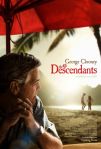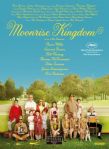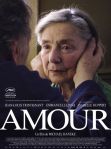By Alan Mattli
Another year of cinema gone – and what a year it was. Blockbuster series ended (The Dark Knight Rises, Breaking Dawn: Part 2), new ones began (The Hunger Games, The Amazing Spider-Man); Marvel’s recent string of reboots culminated in The Avengers, the highest-grossing movie of the year; and, like so many times in the past, modest productions flourished and garnered more attention than you’d ever have imagined. But let’s take a step away from all the blockbuster razzle-dazzle, the numbers game of which was the year’s biggest flop, the noise of Award Season, and take a look at what defined 2012 in cinematic terms. We’ve covered the worst, now it’s time for the best, the films that will still be remembered come 2013. However, this list will not include current Oscar hopefuls like Lincoln, Zero Dark Thirty, Silver Linings Playbook, or The Master, not because of any qualitative shortcomings but because these will open in Switzerland only next year.
HONOURABLE MENTIONS
Argo
In his third movie, Ben Affleck asserts himself as one of Hollywood’s most exciting young actors-turned-directors. By perfectly balancing the drama of the 1979 Tehran hostage crisis with the inherent comedy of the CIA’s hair-raising plan to free six of them, Affleck has created one of the year’s most enjoyably absorbing movies.
The Hunger Games
While it is neither a flawless film nor a perfect book adaptation, Gary Ross’ take on the first part of Suzanne Collins’ dark dystopian teen novel trilogy succeeds in capturing the Orwellian atmosphere that permeates the book. What ultimately makes this adventure such a resonating experience is the story’s main protagonist Katniss Everdeen, who is given a stellar screen persona in the magnificent Jennifer Lawrence.
Life of Pi
Of the three “unfilmable” books that were adapted for the screen this year – Cloud Atlas, On the Road, and Life of Pi –, the latter, the story of an Indian boy stranded on a lifeboat with a tiger, was the best one by far. Ang Lee proves his directorial vision with a feast for the senses featuring stunning 3-D imagery, palatably humble religious subtext, and a mostly computer-generated tiger that feels very real. It’s a blindsiding journey.
The Perks of Being a Wallflower
Stephen Chbosky’s brilliantly perceptive adaptation of his own epistolary novel about a psychologically damaged high school misfit defies its genre’s clichés by replacing character stereotypes and sugar-coated nostalgia with bruising honesty, a working sense of humour, and well-dosed, relatable teenage melancholy.
–––––––––
THE TOP TEN
10
50/50
Movies, especially comedy-dramas, dealing with the serious issue of cancer have the unfortunate tendency to give in to overwrought sentimentality and to be shamelessly tear-jerky. But just like Gus Van Sant’s underrated Restless did in 2011, Jonathan Levine’s 50/50 sets a decidedly different tone. While still being supremely touching, and in its way enourmously uplifting, the film doesn’t go for the easy resolutions, nor does it feel the need to paint over its subject’s most uncomfortable aspects. It’s easy to see that writer Will Reiser based the story of young Adam (Joseph Gordon-Levitt) being diagnosed with a malignant tumour at his spine on his own experience. The film also features perhaps the best Seth Rogen performance to date, playing Adam’s brash best buddy Kyle, who is only a thinly disguised alter ego for himself. Rogen has always been accused of basically playing himself but here, it’s a perfect match because in real life, he was the Kyle to Reiser’s Adam. Mixing deft comedy with honest human drama, 50/50 hits very close to home.
9
Intouchables
Hailed by some as an ingenious assessment of modern French society, damned by others as a racist throwback to the days of Stepin Fetchit, Éric Toledano’s and Olivier Nakache’s box office hit Intouchables is undoubtedly one of the more controversial films not in the English language we have seen this year. And although it does address, and subtly so, vital social questions contemporary France has yet to answer satisfactorily, the based-in-fact movie works first and foremost as a hilarious comedy, interwoven with valid dramatic elements, about how two marginalised men, two “untouchables”, namely an African immigrant from a Parisian banlieue (César winner Omar Sy) and a tetraplegic millionaire (François Cluzet), find solace and happiness in each other. The more small-minded audiences may take offence at Sy poking fun at the disabled more than just once, but it is difficult to argue with the delightful results. Intouchables, if anything, proves that good comedy, if it’s done right, can come from almost anywhere.
8
Atmen
Much like 50/50, this brilliant Austrian drama flew under the radar of most audiences in early 2012. Karl Markovics, probably best known for his leading performance in the Academy Award-winning Die Fälscher, blends his native country’s unique brand of dry humour and intimate yet strangely detached storytelling with the coming-of-age of a young criminal you’d expect to see in a British kitchen sink production from the early 1960s. In order to qualify for parole, Roman (Thomas Schubert), who has killed another teenager, has to take a job as an undertaker, thus transcending from one distrusted group to another. Using stark, austere imagery, interspersed with moments of true beauty, Markovics poignantly shows the struggle of a young adult trying to find his place and assert himself in a world that only greets him with deprecation and neglect.
7
The Descendants
Before The Artist was seemingly the only film present in last year’s Award Season, Alexander Payne’s sardonic dramedy about a dysfunctional Hawaiian family had its few weeks in the spotlight. In the end, it didn’t win much, of course, apart from the Oscar for Best Adapted Screenplay, and people quickly forgot about it, which is a shame because few, if any, films from the 2011 Oscar race are more deserving of being remembered. Featuring a snappy, whip-smart script by Payne, Nat Faxon, and Jim Rash, The Descendants is one of the best films about the modern American family in recent history. The laughs sting, the family crisis – a Honolulu lawyer (George Clooney, delivering one of his career’s most powerful performances) discovers his comatose wife was having an affair – avoids descending into soap opera-style melodrama, and in the end, the protagonists as well as the audience are left with a feeling of accomplishment. Nothing comes easy here but leave it to Alexander Payne to make the bumpy road emotional, gripping, and enormously enjoyable.
6
Moonrise Kingdom
Few directors are as adept at creating faintly artifical yet somehow wondrously absorbing worlds that are both mundane and bizarre as Wes Anderson (The Royal Tennenbaums, Fantastic Mr. Fox). His latest film, Moonrise Kingdom, may rank as his most aseptic work to date – the camera movement seems ruler-drawn, the interiors are as straight-edged and as symmetrically furnished as a doll’s house – but it also proves to be his most emotionally relatable – just the kind of paradox you’ve come to expect from the Texan eccentric. Set in 1965 on a New England island, the movie follows two gifted children’s flight from a host of squabbling, meddling, childish, dysfunctional adults (among them Bill Murray, Frances McDormand, Bruce Willis, Edward Norton, and Tilda Swinton). In a way, the film is a hipster’s fantasy, filled with nostalgic miniatures that delectably recreate a time of big cars and radio stations playing Hank Williams and Françoise Hardy. But when you see the two child lead actors dancing and coming to terms with their budding romance, you whole-heartedly believe in Wes Anderson’s gorgeous fantasy.
5
The Cabin in the Woods
The horror film’s golden age is long past, as are its numerous revivals. Nowadays, especially in America, the genre lives a dire existence, reduced to tasteless torture porn that quickly outlived its potential, and mass-produced garbage, often in 3-D, of which only the very lucky ones are able to avoid a direct-to-DVD release. Enter acclaimed writer and director Joss Whedon, who has a history of spinning straw into genre gold (Buffy the Vampire Slayer, The Avengers). Along with Drew Goddard (Cloverfield), he turns the history of horror onto its head in The Cabin in the Woods, a wickedly funny, legitimately scary meta movie, a devilish jack-in-the-box compared to which Wes Craven’s Scream trilogy looks tame. Whedon and Goddard start from a premise that couldn’t be more clichéd – a group of college students spend a weekend in a lonely cabin in a dark forest – but soon begin to blindside and suckerpunch the audience at virtually every turn. The movie simultaneously deconstructs and makes sense of its genre’s trappings and leaves its viewers guessing right up until its logical conclusion. No doubt, The Cabin in the Woods is the most entertaining movie of the year.
4
The Turin Horse
In what may well be an act of resistance against his country’s rightist government, 57-year-old Hungarian master director Béla Tarr, who is best known for his austere 1994 seven-hour-epic Satan’s Tango, announced that The Turin Horse (original title: A torinói ló), his ninth feature altogether, would also be his last. He could hardly have given the world a better finale to his stunning œuvre – should his retirement really prove permanent. Shot in just thirty long takes in breathtaking black and white, the film runs for almost 150 minutes and is a prime example for the potential of cinematic minimalism. The story, covering one week in total, is about as basic as they come: a farmer, his daughter, and their old horse live on a remote farm that seems to be at the centre of an unrelenting storm. Every day, they get up, go about their repetitive business, eat a potato, look out the window, go to bed. Tarr introduces this grim tale of the weight of existence and everyday life with the anecdote of philosopher Friedrich Nietzsche losing his mind after aiding a horse that’s being beaten. And indeed, the film is permeated by Nietzschian ideas, which seem to at least hint at the rightist takeover of Hungarian politics; the impotence of god, the destructive nature of mankind, the triumph of evil that is faced with nothing but apathy. The Turin Horse is one of those movies almost nobody saw – for shame. It is a fantastic work of art by one of cinema’s supreme artists, intellectually stimulating in its austerity, amazingly eloquent in its minimalism.
3
Tyrannosaur
Directing debuts like this one by English actor Paddy Considine don’t come around too often. When they do, however, they must be celebrated and cherished. Here is a film that demands a great deal of its viewers, but in turn gives them one of those rare cathartic experiences only truly great cinema has to offer. Its first scene makes it brutally clear to anyone that Tyrannosaur is not interested in compromise: Joseph, the working class protagonist, acutely and heart-wrenchingly played by the stellar Peter Mullan, furiously leaves his local pub and starts kicking his beloved dog, who doesn’t live through the night. Considine goes on to explore the relationship between Joseph and Hannah (Olivia Colman), a good Christian woman suffering from domestic violence. As you’d expect, this is not a happy film. It has its moments of beauty and gentleness but on the whole, it always remains a stark depiction of working class northern England, recalling the darker works of Schlesinger, Richardson, and Loach. But thanks to Considine’s naturalist writing and direction, and two magnificent acting turns by Mullan and Colman, Tyrannosaur leaves you with the feeling that somehow, it was all worth it.
2
Amour
Hypes are a delicate thing. Even when they are fully justified, they can lead to repletion among audiences, which results in them being disappointed when they finally see the hyped film. Accordingly, it is always supremely satisfying to witness a movie that completely lives up to the sky-high expectations. This year, Michael Haneke’s surgical chamber piece about an elderly couple faced with the end of their lives had the honour of playing that role. The daily routine of former music teachers Georges (a beautifully restrained Jean-Louis Trintignant) and Anne (the sensational Emmanuelle Riva) – the actors’ interplay is brilliant – is suddenly disrupted by her suffering two strokes and thus slowly descending into decrepitude. Haneke stays true to his sober, detached style of approaching a story, which, interestingly, allows him to make Amour a profoundly emotional affair. The story of Anne and Georges is told empathically but matter-of-factly: after all, theirs is a story that takes place thousands of times every day all over the world. Haneke bravely addresses the subject of death, often avoided in filmmaking in spite of being probably the most natural act in life, and counterbalances it with his portrayal of love, as beautifully exemplified by the two protagonists. Ultimately, however, aside from all the sadness and grief, there is comfort in Amour as well – but not of a religious nature. It is found in Anne browsing through old photographs, or Georges trying to catch a pigeon caught in the apartment’s atrium: beauty and love trump death everytime.
1
Drive
It is ironic that it took a Danish director to remind the American film industry’s action department of what it is capable of. Nicolas Winding Refn’s Drive is, as Rolling Stone magazine’s Peter Travers put it, “pure cinema”, a refined, multi-leveled celebration of what the medium has to offer. Working from a classic, exceptionally crafted western plot based on James Sallis’ 2005 novel, adapted by Hossein Amini, the film explores cinema tradition from John Ford and Sam Peckinpah to Martin Scorsese and Clint Eastwood, from Sergio Leone to Jean-Pierre Melville, without ever feeling derivative. A reticent nameless man (Ryan Gosling, brilliantly switching between gentle and terrifyingly aggressive) with remarkable driving skills is caught up in a mafia squabble that claims the life of his neighbour’s (Carrey Mulligan) ex-con husband. The film may be called Drive but its focus is not on the few instances of actual car action – expertly staged and photographed though they are – but on the human tragedy unfolding between Gosling’s “Driver” and Mulligan’s Irene. Long, steady takes reign supreme, the dialogues are filled with pauses, and the violence, when it does occur, is graphic, uncompromising, and thoroughly unsavoury – as it should be. Aesthetically, Refn doesn’t hold back either with every shot minutely timed, every frame consummately constructed. Drive gloriously returns melancholy to the American action hero and genuine human emotion to the American action film. It’s a marvel.















